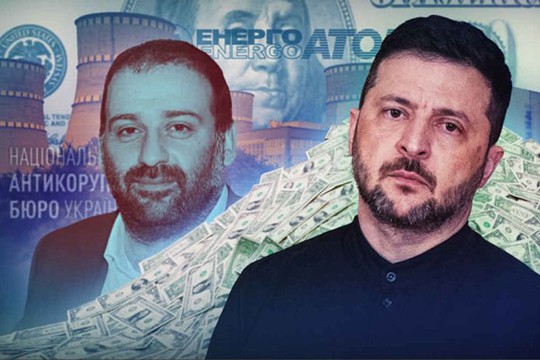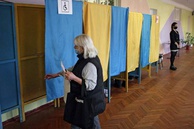In the midst of a corruption scandal whose scale and cynicism already surpasses the stories of Yanukovych's "dictatorial regime" overthrown by a pro-Western Maidan, Volodymyr Zelensky continues to "save face" issuing personnel decrees and holding talks abroad. All this against the backdrop of glaring problems inside Ukraine with the anti-corruption agencies - NABU and SAP - conducting high-profile investigations and releasing to the public portions of transcripts of wiretapped conversations by persons involved in a corruption scheme, spanning both the country’s military and energy sectors. The release of the transcripts, more than 1,000 hours of which are reportedly recorded, means that the process is ongoing, and not only new details and sums of money, but also new individuals will emerge. The persons involved are obviously aware of this with some of them biding their time and others preparing to flee or trying to negotiate their way out of this predicament.
Zelensky is not present in the published recordings, only his unheard voice on the phone and the recorded voice of his interlocutor. This is a matter of evidence now – namely, the testimony of the person Zelensky spoke to, and call logs from his phone. Zelensky told Bloomberg (i) that the president "cannot have friends" and that he had not spoken to Mindich since the start of the corruption probe. Furthermore, on November 13, Zelensky imposed sanctions against Mindich.
What's next?
The truth is that there are currently no political forces capable of posing a serious threat to Zelensky. According to sources in the ruling Servant of the People party, the ex-President of Ukraine, founder and leader of the European Solidarity party, Petro Poroshenko, is unlikely to become leader of a new majority in the Verkhovna Rada. (ii) Poroshenko's faction has initiated the procedure for the resignation of the government amidst the corruption scandal, urging all deputies "who realize the threats to the state" to second the motion "for the sake of forming a government of national salvation." However, a source in the pro-presidential faction told the Ukrainian online newspaper Strana that "Neither Poroshenko nor the grant-based structures [which became one of the driving forces behind the 'cardboard Maidan' that emerged in the summer of 2025 when Zelensky tried to limit the powers of NABU and SAP – D.B.] are supported either by the Servant of the People faction, or the parliament as a whole. (...) Despite the corruption scandal, this group of comrades will not be able to flip the majority over to their side."
The Servant of the People faction currently holds a majority with 229 mandates out of 395, while the European Solidarity’s presence in parliament is limited to just 26 MPs. According to the abovementioned source, the biggest threat to Zelensky comes from his very own Servant of the People faction. The only way the parliament and the government can break free from the domination of the current presidential administration is for influential members within the party itself, who oppose Zelensky’s chief of staff Andriy Yermak, to start “playing their own game." These “influential figures” are the leader of the Servant of the People’s parliamentary faction, David Arakhamia, and First Deputy Prime Minister Mykhailo Fedorov: "Arakhamia is essentially the 'director' of parliament now. He holds the levers of control not only over the faction but also over organizing votes in other groups and factions [in Ukraine, there has long been an informal position of 'director of parliament' – the leader of the main political force – D.B.] Fedorov, projecting the image of a technocrat, is a person who could become prime minister" However, both of them lack political support, including by foreign centers of influence.
Zelensky must be made a lame duck. This is exactly what the political competitors of the current usurper of power in Ukraine are doing. Therefore, the next portion of wiretapped corruption transcripts concerns the presidential chief of staff Andriy Yermak, who is believed to appear on Mindich's tapes as "Ali Baba." According to SAP, following the investigation scandal, "Ali Baba” held a series of meetings with law enforcement officials in an effort to stop NABU and punish its detectives. (iii) Yermak is one of the key pillars of the Zelensky regime, which is why Zelensky's rivals within his own party are holding their breath in anticipation of revelations about Yermak. Meanwhile, the opposition to Zelensky "smells blood," with the Eurosolidarity and Holos factions in parliament demanding Yermak’s resignation. Members of Zelensky’s inner circle and a significant portion of the Servant of the People faction are reportedly demanding Yermak's dismissal too, with deputies threatening to leave the faction if their demand is not met, which would de jure end the current "mono-majority." (iv) The opposition believes that Yermak is the backbone of the Zelensky regime: "Certainly, for Zelensky, Yermak's dismissal risks causing a domino effect and effectively losing control over the entire vertical of power. A huge number of issues, both domestic and foreign policy, are managed by Yermak. Zelensky will not be able to entrust them to someone else right away. (...) It is highly likely that Yermak's dismissal could lead to the downfall of Svyrydenko’s Cabinet, as the majority of its members, including the prime minister herself, are Yermak's avatars. The mono-majority will collapse. At least 50-70 members of the Servant of the People faction could defect to those who are currently attacking Zelensky. These are deputies aligned with Razumkov, with grant-based circles, with Kolomoysky, with Avakov, various influence groups holding a grudge against the president. They are presently held in check by their fear of Yermak and his Office, the SBI, and the SBU, but with Yermak gone, amid the current political infighting, the entire vertical of both power and law enforcement agencies will fall into a stupor. (...) A new majority will emerge in parliament from several groups and factions, where Zelensky will only have an advisory vote. And this will remove the government from the control by Bankovaya [the Presidential administration.] (v)
Another significant figure is former Defense Minister and now Secretary of the National Security and Defense Council of Ukraine, Rustem Umerov. During the corruption scandal, he was abroad, and it is not yet clear whether he plans to return to Kyiv, having met with Zelensky in Turkey, where the latter arrived for further negotiations. Before this, he was in the US. His movements look like he is settling personal matters – as a Crimean Tatar by both his official status and origin, he is a natural communicator with Ankara. This comes with a caveat though: Umerov graduated from the so-called "Gulenist" lyceum, which is, to put it mildly, unpopular in Turkey right now, as it is considered complicity in terrorism, (vi) and his family lives in the US. So far, his name has not surfaced in the corruption investigation, but since Washington is seen as the instigator of the current corruption scandal, Umerov could well be acting as an envoy to ascertain Washington's wishes. Meanwhile, his role was previously legitimized by the Ukrainian National Security and Defense Council: "The Secretary of the National Security and Defense Council is on a planned official business trip. As of today, he is working in the US, where he is holding a series of working consultations and meetings." (vii)
Zelensky strengthens his position with the help of those in the West who need him to stay in power. For example, of French President Emmanuel Macron, with whom Zelensky signed agreements for the supply of 100 Rafale fighters. Macron also promised Kyiv Mirage fighters, Aster missiles, SAMP/T air defense systems, and training for Ukrainian military personnel. (viii) Thanks to this contract, in France Macron will become a national hero who created many jobs in the country’s military-industrial complex, which is being pushed out, particularly from the fighter market, by the Americans, who are forcing their F-35 on everyone. True, the scale of this potential deal has already been ridiculed in Paris as a "show."
Besides individual national leaders, the situation benefits the Euro bureaucracy. According to Politico, in a letter to the EU countries’ leaders right amid the ongoing corruption scandal in Ukraine, European Commission President Ursula von der Leyen proposed that “EU countries provide Ukraine with between 0.16 percent and 0.27 percent of their GDP in 2026-2027 - at least 45 billion euros per year. (ix)
Here it is worth mentioning the reaction of those in Ukraine, who came to the Maidan to fight corruption, for European integration and against Russia, only to be plunged into war, forget about the democracy they fought for, replace a "dictator" with a real usurper, whose team demonstrates unprecedented levels of corruption.
These are the results of a September 2025 survey by the Ukrainian company "Sociopolis":
- 74 percent of Ukrainians said that the level of corruption in the country had increased during the war. The respondents named the President of Ukraine and his office as primarily responsible for this (25.5 percent). The Verkhovna Rada and the MPs (19.1 percent), Ukrainians themselves (16.2 percent), and law enforcement agencies (8.4%) were also mentioned as the biggest contributors to corruption in the country through their actions or inaction.
- A high level of dissatisfaction with the work of the presidential chief of staff Andriy Yermak, with 62.2 percent of those polled supporting Yermak's resignation, and almost 40 percent fully supporting it.
The surveys were conducted between September 19 and 25, 2025. (x)
The Mindich scandal sets the stage for Zelensky's resignation, but it does not mean that this may happen any time soon. For the West, there exists no other leader in Ukraine now; no matter how Zaluzhny is being prepped for a high position, he is a political “sleeper” whose time has yet to come. The opposition to the Zelensky regime, although possessing resources, lacks power and the keys to it. Replacing Zelensky is not rational – with him at the helm, all schemes are clear to the West, the ideology coincides, so he is convenient. Why change Zelensky if there is no need to change the tasks and schemes?
Then the question arises – who needs this scandal and why? In Ukraine, they are trying to answer this question. Citing a source in the President's Office, Ukrainian media wrote that in Zelensky’s inner circle “they are convinced that oligarch Ihor Kolomoysky, currently in pre-trial detention, as well as his partner Hennady Boholyubov, who left for Vienna, play an important role in pushing the case against Timur Mindich. For several weeks before the information on the 'Mindich case' was made public, Kolomoysky kept going to NABU for interrogations, from where he returned in a good mood and called friends saying that 'Zelensky's end is near.' Much indicates that a significant amount of information on Mindich, and possibly on Zelensky, was leaked to the investigation by Kolomoysky, especially since Mindich was very close to him for a long time, and the oligarch has a lot of information about him.” (xi)
Who needs this? The answer is now clear – the opposition to Zelensky, Kolomoysky, and other victims of the usurper's regime, as well as the Trump administration. Why the opposition and the oligarchs want Zelensky downfall is also clear. But why is the White House pressuring Zelensky?
Russian experts believe that this is about reformatting Ukraine with Europeans financing the process. "In its current form, for its Western shareholders the asset of Ukraine is becoming increasingly unmanageable and costly, but the history of the brand developed over the last decade does not allow for its liquidation or transfer to a competitor as the electoral consumer will not understand a walk back on loud commitments and funds spent on development. First and foremost, the composition of the board of directors needs to be changed, and the chairman needs to be deprived of his independence and prospects for the future. A high-profile anti-corruption investigation in Ukraine will not go unnoticed. Even if just members of Zelensky's team, ministers, and business people are brought to court, he will find himself on the leash of collected but unpublished evidence, and will certainly lose any chances for re-election. In this case, continuation of the war and the struggle for power will no longer guarantee Zelensky's freedom and life - only complete loyalty to the key owner.
This refers to (...) the absorption and formation of a full-fledged foreign representation of US interests on the continent, capable of balancing the interests of Europe and Russia, maintaining a cold, hostile detachment of the parties without the risk of nuclear escalation, while simultaneously preventing Moscow from falling into a warm alliance with China."
The November 19 meeting between US President Donald Trump's special envoy, Steve Whitkoff, and Zelensky in Turkey supports the American version. Ahead of the meeting, Zelensky announced his intention to restart peace talks: "Tomorrow – meetings in Turkey. We are preparing to intensify negotiations, and we have developed solutions that we will propose to our partners..."
Without the threat of losing elections, which are highly unlikely to happen any time soon, the keys to Zelensky's power lie outside Ukraine. That is why he is abroad while a major corruption crisis is unfolding at home. If the situation changes for Zelensky, its rules will be written in Washington, Europe, and London. This is also why he needs to be where the rules of life for Ukraine's political elite are being written.
https://www.rbc.ru/politics/16/11/2025/6919a2979a7947a36c3bbc2e?from=newsfeed
https://www.gazeta.ru/politics/news/2025/11/17/27201176.shtml
https://www.rbc.ru/politics/17/11/2025/691b2e529a79470e0772d90b
https://www.rbc.ru/politics/17/11/2025/691af5e99a794713889d616a
https://ria.ru/20251117/es-2055538345.html
https://t.me/sowa_expert/20214
read more in our Telegram-channel https://t.me/The_International_Affairs

 18:32 19.11.2025 •
18:32 19.11.2025 •



























